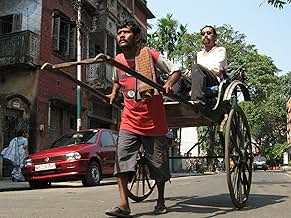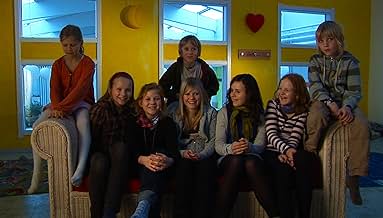VALUTAZIONE IMDb
7,2/10
3417
LA TUA VALUTAZIONE
Aggiungi una trama nella tua linguaHappy takes us on a journey from the swamps of Louisiana to the slums of Kolkata in search of what really makes people happy.Happy takes us on a journey from the swamps of Louisiana to the slums of Kolkata in search of what really makes people happy.Happy takes us on a journey from the swamps of Louisiana to the slums of Kolkata in search of what really makes people happy.
- Regia
- Sceneggiatura
- Star
Recensioni in evidenza
Loved the topic but don't be fooled by the clear bias that just gets stronger and stronger with this movie. (Opinions are like derrieres, everyone has one) but to present this as a documentary and not own the fact that it promotes certain things and dismisses others is to lower it's credibility.
Here's my bias: Liberty is a moral imperative. -and it's not for the government to decide for people what will or will not make them happy because eventually, they will use their power to impose it on everyone. This is what is so wrong with Marxism, Socialism et al. The collective notion that if it's good for one person, it must be good for all. (That's a lie too, because it's usually only good for the people who are trying to subjugate and enslave others.) It takes a while for this movie to show it's bias but show it, it does: Religion, bad. Communes, good. And many more. For any film to ignore the matter of free will, individual choice and the ability to make those personal decisions about what one choosed to pursue and how he will spend his time, is to ignore an essential quality for happiness.
Not that part of this film weren't moving. The woman who surmounted getting run over by a car was incredibly moving, but the ingredients for happiness are not the same for everyone, yet this film has a collectivist bias. Being free enough to discover what is important in one's life is part of the joy of living. This movie may either intentionally or unintentionally promote the notion that the recipe is the same for everyone. Just do as I say!
Here's my bias: Liberty is a moral imperative. -and it's not for the government to decide for people what will or will not make them happy because eventually, they will use their power to impose it on everyone. This is what is so wrong with Marxism, Socialism et al. The collective notion that if it's good for one person, it must be good for all. (That's a lie too, because it's usually only good for the people who are trying to subjugate and enslave others.) It takes a while for this movie to show it's bias but show it, it does: Religion, bad. Communes, good. And many more. For any film to ignore the matter of free will, individual choice and the ability to make those personal decisions about what one choosed to pursue and how he will spend his time, is to ignore an essential quality for happiness.
Not that part of this film weren't moving. The woman who surmounted getting run over by a car was incredibly moving, but the ingredients for happiness are not the same for everyone, yet this film has a collectivist bias. Being free enough to discover what is important in one's life is part of the joy of living. This movie may either intentionally or unintentionally promote the notion that the recipe is the same for everyone. Just do as I say!
While I enjoyed some of this film, a couple of things bothered me. Judging from the narrator speaking English, the audience of this film was primarily people who speak English. It is inexcusable in 2011 to not have interpretation either with voice over or subtitles of the non-English portions. Glad the people from India, Okinawa, and other non-English speaking people spoke to the cameras. It might have been useful to know what you were talking about.
The other thing that concerned me was the likelihood of the ultra rich to say "we don't need to pay you a living wage. It won't make you any happier anyway." They only briefly mention "once basic needs are met". So I can see this film joining the fake theory of trickle down economics to become part of the "arguments of justification: used by that group to explain to themselves why it's OK to holding on to more and more of the wealth.
The other thing that concerned me was the likelihood of the ultra rich to say "we don't need to pay you a living wage. It won't make you any happier anyway." They only briefly mention "once basic needs are met". So I can see this film joining the fake theory of trickle down economics to become part of the "arguments of justification: used by that group to explain to themselves why it's OK to holding on to more and more of the wealth.
Yes, instead of Gross National Product, the tiny country of Bhutan, nestled in the eastern end of the Himalayas, focuses on Gross National Happiness. In direct contrast to a country like Japan, where workers under too much job-related stress to increase efficiency and minimize errors are dying way too young.
That in a way captures the focus of this film, "Happy." It examines the human characteristic of "happiness", what it really is, how one achieves it, and how it relates to our lives in total. The film is a good mixture of human examples in the real world, and researchers explaining their findings.
The very first person profiled is a very poor, rickshaw operator in India. But he is happy, because his home is sufficient, and when he gets home from work is greeted by his children. My favorite, because it relates to my own Cajun upbringing, is an extended Cajun family in Louisiana, not wealthy in material things, but enjoying a wealth of happiness from hard work, and sharing the day's seafood haul and enjoying the natural beauty of the waterways and the wildlife.
There are two important, but opposing forces, at work in most humans. One is the need to achieve a certain degree of success, wealth, beauty, and recognition. But this requires competition which in itself does NOT bring true happiness. The other force is to give back to the Earth and society, to have friends, to take care of the less fortunate, to be kind to others, to do good deed, to take time to play and laugh and have fun for no reason than to simply be happy.
It is this second type of force, which is cooperation rather than competition, that leads to better health, both mental and physical, and in general to longer lives. I can relate, I am retired from a career that required competition to get promotions and bigger pay increases. I was sufficiently successful at that to retire, debt-free, at 50.
But in retirement I am much happier, and I believe it is because I now refuse to compete, at anything, I don't gamble, and I play sports only for fun. I often volunteer to help others, even if it is to pause 15 seconds and help a stranger with loading their car with heavy groceries. It just seems like the right thing to do. Or simply greet a stranger with "Good day" and a smile.
The film makes the point, doing the things that make us happier may not take much effort at all, it is just being ourselves and reminding ourselves that being happy is simply an activity that needs to be practiced, just like anything we enjoy.
Good film, I wish everyone could see it.
That in a way captures the focus of this film, "Happy." It examines the human characteristic of "happiness", what it really is, how one achieves it, and how it relates to our lives in total. The film is a good mixture of human examples in the real world, and researchers explaining their findings.
The very first person profiled is a very poor, rickshaw operator in India. But he is happy, because his home is sufficient, and when he gets home from work is greeted by his children. My favorite, because it relates to my own Cajun upbringing, is an extended Cajun family in Louisiana, not wealthy in material things, but enjoying a wealth of happiness from hard work, and sharing the day's seafood haul and enjoying the natural beauty of the waterways and the wildlife.
There are two important, but opposing forces, at work in most humans. One is the need to achieve a certain degree of success, wealth, beauty, and recognition. But this requires competition which in itself does NOT bring true happiness. The other force is to give back to the Earth and society, to have friends, to take care of the less fortunate, to be kind to others, to do good deed, to take time to play and laugh and have fun for no reason than to simply be happy.
It is this second type of force, which is cooperation rather than competition, that leads to better health, both mental and physical, and in general to longer lives. I can relate, I am retired from a career that required competition to get promotions and bigger pay increases. I was sufficiently successful at that to retire, debt-free, at 50.
But in retirement I am much happier, and I believe it is because I now refuse to compete, at anything, I don't gamble, and I play sports only for fun. I often volunteer to help others, even if it is to pause 15 seconds and help a stranger with loading their car with heavy groceries. It just seems like the right thing to do. Or simply greet a stranger with "Good day" and a smile.
The film makes the point, doing the things that make us happier may not take much effort at all, it is just being ourselves and reminding ourselves that being happy is simply an activity that needs to be practiced, just like anything we enjoy.
Good film, I wish everyone could see it.
Tom Shadyac, the director of the Nutty Professor read in a NY times article that although the US was one of the richest countries it was nowhere near the happiest and also noted from his own experience materially successful people he knew were often less happy than their gardeners. Intrigued he funded director Roko Belic to make this movie investigating what makes people happy. He goes to Denmark, Namibia, Scotland, China, Kenya, Brazil, Japan, Bhutan and India and interviews a bunch of people and the result is quite an interesting movie on how things play out. They start with a guy in India living in poverty in one of the worse slums but he's about as happy as the average American partly because there is a lot of community involvement. In Japan he meets the Okinawa islanders who generally have a cheery simple life and live to about 100 and also the family of a pressured salary man who dropped dead in his thirties from stress and overwork. It's interesting to see the contrasts and it may well give some inspiration for your own life.
Great movie. When I watched this movie it made me feel that happiness is obtainable. Through religion, and doing the right thing. I believe this movie taught a very valuable lesson as in if you do good things, it can make you feel good. People think scientific facts would matter but science doesn't define emotions. Some things are unexplainable in life for a reason. I think this is great, and enjoyable to watch. I have seen this movie multiple times when I was upset and it always brought me out of my funk and helped me feel positive again. I showed this movie to many members of my family and it made them not only get emotional, but they felt this was a great guide to become a happy person.
Lo sapevi?
- ConnessioniFeatured in Zomergasten: Episodio #24.3 (2011)
- Colonne sonoreRendezvous with Rama
Composed by Chris Conway
Performed by Baluji Shrivastav
© 1999. Used by permission of ARC Music (www.arcmusic.co.uk)
I più visti
Accedi per valutare e creare un elenco di titoli salvati per ottenere consigli personalizzati
- How long is Happy?Powered by Alexa
Dettagli
- Data di uscita
- Paese di origine
- Sito ufficiale
- Lingue
- Celebre anche come
- Happier
- Luoghi delle riprese
- Aziende produttrici
- Vedi altri crediti dell’azienda su IMDbPro
- Tempo di esecuzione1 ora 16 minuti
- Colore
- Proporzioni
- 1.78 : 1
Contribuisci a questa pagina
Suggerisci una modifica o aggiungi i contenuti mancanti























